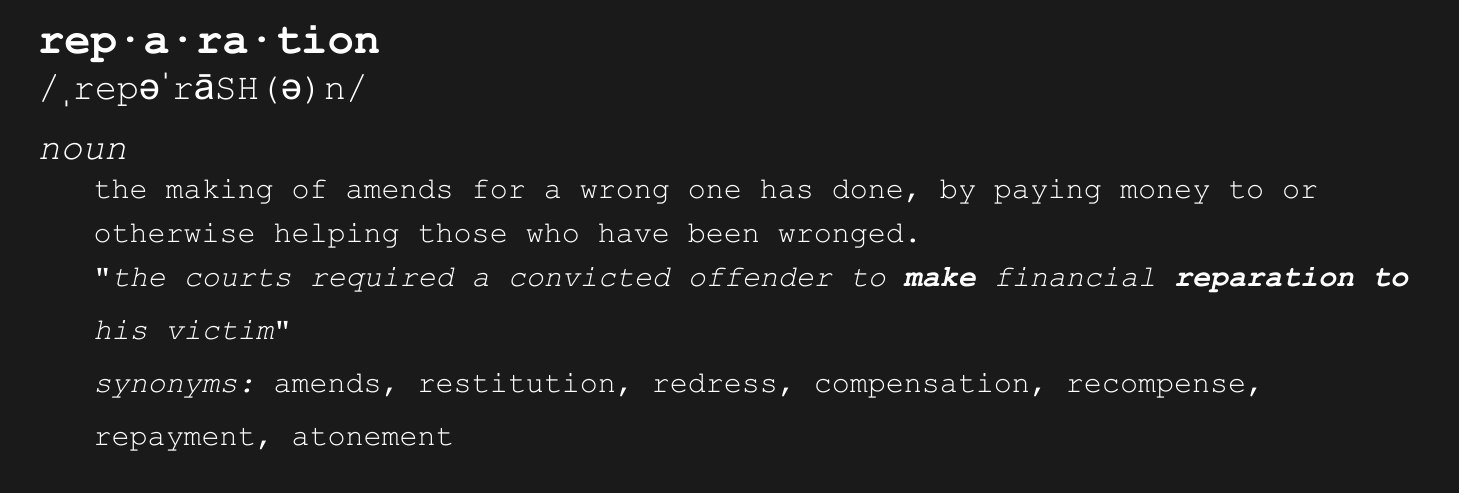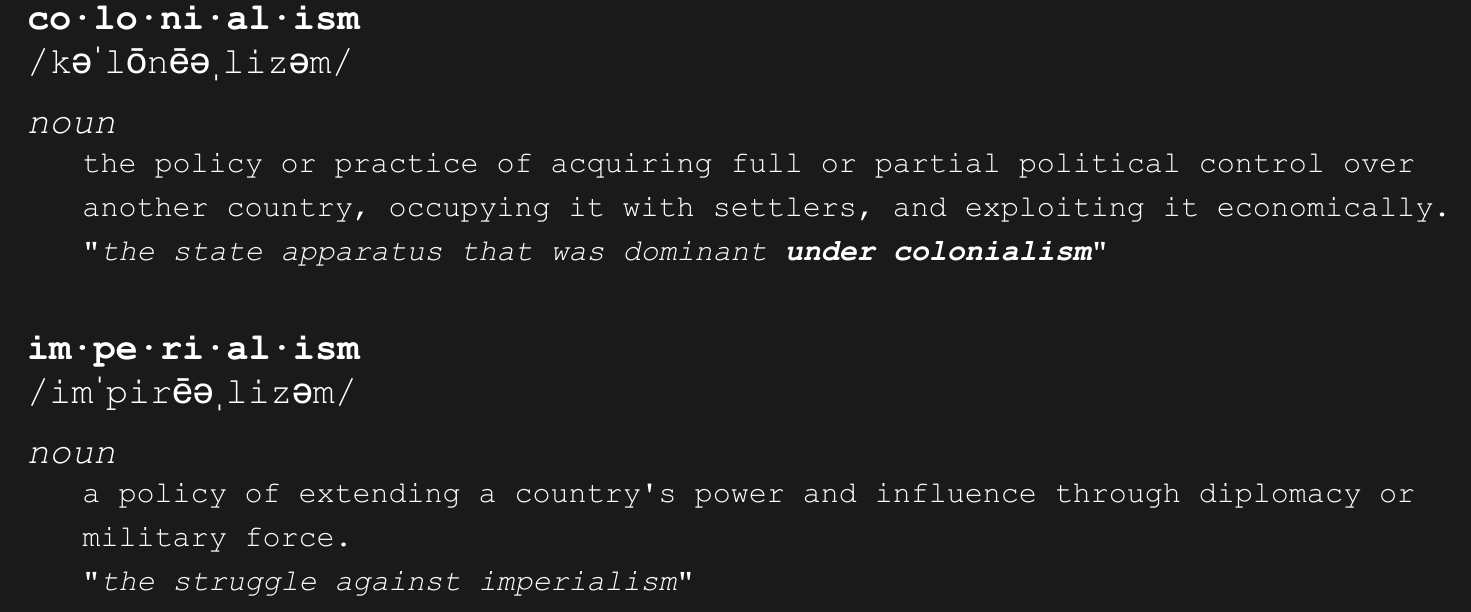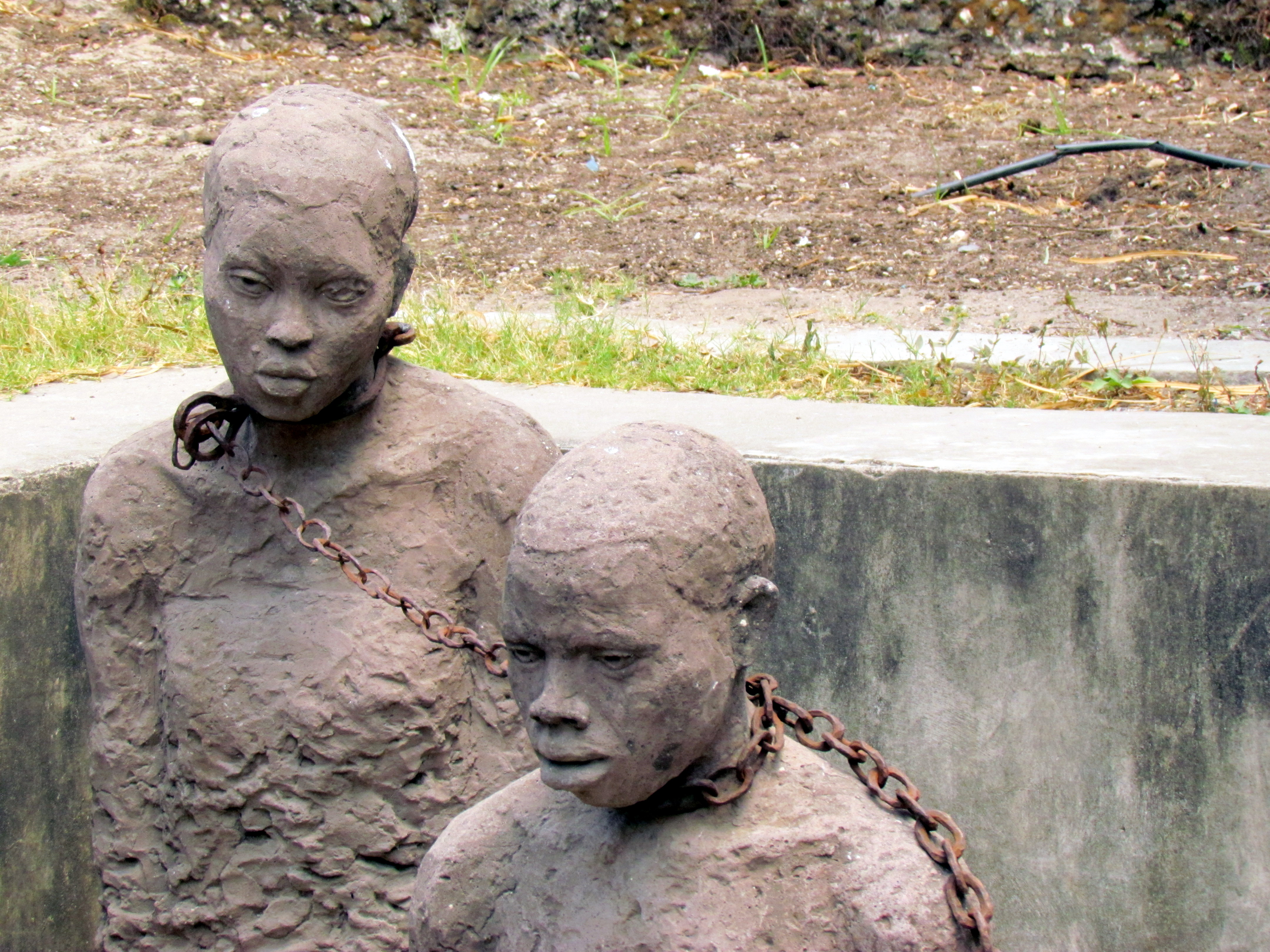By Kenton Merrill

Restorative justice is a principle I believe in – I desire a world that makes new, rather than continues to down the tired old path of tearing down. We have tried an eye for an eye for long enough, how about we try something new? Why not try liberation from the washed up ways of faux justice? Restoration is an idea that can break toxic cycles of revenge. It can attempt to make things whole again; this includes the idea of reparations.

Just to be clear, I don’t know exactly how legitimate, ideal reparations will look in the modern age. I don’t know how the exact payment will take place. I don’t claim to know all of the answers as to how to right the wrongs for our sins of the past, but I do know one thing: They are overdue, and I intend to explore the options for reparations from the perspective of a libertarian socialist. This essay intends to explore ways in which reparations can become a reality, and argues that reparations themselves are libertarian.
I believe that if we, as libertarians, are going to take the Non-Aggression Principle seriously, we should be looking to defeat institutions that violate such principle – yes, taxation is theft, but justice also allows for aggression in return. Institutions such as colonialism, racism, imperialism, toxic masculinity are as American as apple pie. I have often read comments on the Internet and talked with people who say things such as “reparations will start a race war!” or those of us who favor such things are “living in the past.” The truth is that slavery was not that long ago, and many who were under the conditions of slavery are still trying to rebound from a system that benefits from inheritance, private property, and white male privilege. No, these systematic institutions are not always easily visible from my personal eyes, but listening to people and trying to understand where they are coming from go a long way.
It was determined by Demos Report, in association of the Institute for Assets and Social Policy at Brandeis University which found that as recently as 2011, the median white household income had $111,146 in wealth holdings, while the median black household income had only $7,113. This racial economic injustice disparity is the direct product of centuries of policies that deliberately excluded and oppressed African Americans. (1)
As Dane Posner, co-member of the Libertarian-Socialist Caucus of the Libertarian Party put it:
Private property ownership in America has been passed down through generations by individuals who slaughtered, or benefited from the slaughter of this land’s original inhabitants. Following the violent seizure of this land, dwellings, factories and other profit-generating structures were constructed through forced involuntary slave labor. Following the abolition of slavery in the United States, former slaves and their descendants were left without homes or compensation for their labor. If the so-called ‘non-aggression principle’ is the pinnacle of all libertarian philosophies, the only just compensation for the centuries of NAP violations that built this country from the ground up would be reparations in the form of money and/or property, at the expense of the descendants of those who benefited from the violent seizure of land, who profited from the involuntary ‘free’ labor of slaves.

The more closely property norms are examined, the further one can see the blood, violence, and illegitimate ways in which private property is acquired. The Native Americans understand this and effects of U.S. colonialism and imperialism.
There is a strong sense of divisiveness that the topic of reparations emits. “Well, I did not personally own any slaves, why should I pay?” My answer to that is the U.S. has already paid reparations to Japanese Americans who were victims of internment camps through the Civil Liberties Act of 1988, signed into law by President Ronald Reagan, and Germany paid reparations to those who were victims of the Nazi regime. Paying the descendants of oppression is not going to kill us. Is it that people believe we are too late to pay for our shames? When is too late? I think now is the time.
Types of Reparations
The idea of reparations has two main components: the right of the victim of an injury to receive reparation, and the duty of the party responsible for the injury to provide redress. (2)

The main ways reparations can be sought by individuals is through judicial systems, or they can be policies introduced by the state to address the concerns or needs of a wider populace. The first strategy is vital in creating legal precedent, the second is certainly a more efficient way to recognize the concerns of groups of people as a whole. While using the state is unpopular amongst libertarian circles (and understandably so), there is and has historically been a libertarian case for using force to combat injustice. Such things like marriage equality and desegregation are examples of this.
The United Nations’ Basic Principles and Guidelines on the Rights to a Remedy and Reparation for Gross Violations of International Human Rights Law and Serious Violations of International Humanitarian Law (3) describes the five formal categories of reparations as restitution, compensation, rehabilitation, satisfaction, and guarantees of nonrepetition. The first two of these are the main focal point of the discussion, given that these two of the four listed below have already happened in some situations.
Restitution
Restitution simply restores something that was lost. It measures to serve victims of injustice in restoring what was taken away. This can include a variety of things related to slavery, but most notably return of property.
Damages Compensation
The provision of compensation for economic damages that were passed down is currently the most talked about reparation in the political arena. These damages can include monetary loss, but also consist of physical or mental damages that were done.
Rehabilitation
This can include psychological, medical, social services, and legal assistances.
Satisfaction
Consists of various measures which include the cessation of human rights violations and abuses, searching for the disappeared, truth-seeking recovery and reburial of remains, judicial and administrative sanctions, public apologies, commemoration, and memorialization.
Guarantees of Non-Repetition
These are reforms which insure of the prevention of future abuses, including: civilian control of the military and security forces, strengthening an independent judiciary, protection of civil service and human rights workers, the overall promotion of human rights standards, and the establishment of mechanisms to prevent and monitor social conflict and conflict resolution. Guarantees of non-repetition have already happened in the form of equal rights acts, desegregation and actions that have given African Americans a fair chance in the workplace.
Murray Rothbard
Even Murray Rothbard was open to the idea when he wrote the Ethics of Liberty. Albeit, Rothbard admitted the complexities of the situation, this was during his “New Left” stage.
We have indicated above that there was only one possible moral solution for the slave question: immediate and unconditional abolition, with no compensation to the slavemasters. Indeed any compensation should have been the other way—to repay the oppressed slaves for their lifetime of slavery. A vital part of such necessary compensation would have been to grant the plantation lands not to the slavemaster, who scarcely had valid title to any property, but to the slaves themselves, whose labor, on our “homesteading” principle, was mixed with the soil to develop the plantations. In short, at the very least, elementary libertarian justice required not only the immediate freeing of the slaves, but also the immediate turning over to the slaves, again without compensation to the masters, of the plantation lands on which they had worked and sweated. (4)
(From: Ethics of Liberty, chapter 11: “Land Monopoly, Past and Present”.)
*Author’s Note: Even though Rothbard supported reparations for the living slaves, I want to be intellectually honest in saying that I do not believe he would support reparations in the form of compensating future generations for the sins of the past. However, his views are very much worth noting in this piece.
Noam Chomsky
When Noam Chomsky, a fellow libertarian socialist and most notably an Anarcho-Syndicalist, was asked at a Harvard University discussion forum about whether or not he would be supporting reparations, he said: “Would I? Very much so.

“Not just African Americans. We ourselves didn’t own slaves, but we – me – are rich and privileged because of the torture of blacks for centuries. And yes we own them reparations.” said Chomsky.
Later, he suggested that any group of people abused by U.S. imperialism should be paid back, saying: “The same with the remnants of Native Americans. Same with countries that we’ve destroyed. What about Iraq? I mean we’ve devastated Iraq, killed hundreds of thousands of people, generated millions of refugees, created sectarian conflict that’s destroying the place. Is it our responsibility? Sure.” said Chomsky.
“I think the call for reparations is very legitimate,” he added. (5)
Reparations as a Call to Action
An anarchist idea which I am intrigued by is the idea of reparations as a verb. This is the idea that as the Black Autonomy Network puts it:
…isn’t a demand to be made of the state, not for 40 acres and a mule (with inflation adjusted) or anything else. Along with reparations as a demand, we are also not interested in it delivered through capitalist property relations or economics (any economics). We agree with Saidiya Hartman when she says “I refuse to believe that the slave’s most capacious political claims or wildest imaginings are for back wages or debt relief. There are too many lives at peril to recycle the forms of appeal that, at best, have delivered the limited emancipation against which we now struggle.” We re-conceptualize reparations as an action, an attack on the order built off of our stolen labor – our stolen lives – which confines our existence to slavery, to wages and debt, to prisons and death, not just 500 years ago but today, here and now.
As libertarian socialists, many of us view the act of reparations as the forms taken in which our liberation already exists. The ways in which our communities have had to exist outside of the law, outside of the economy, to take care of ourselves and each other… The autonomous zones that form in riots when we kick the police our of our neighborhoods. The breakdown of property relations when we loot the commodities we can’t afford but are told to want, only separated from us by the threat of state violence and a window, and share them with strangers on the streets. These acts of survival and attack carry in them the forms of organization and social relations that will open space for anarchy, and it is from these that we move to the liberation of territory, the destruction of work and the economy, and the abolition of the state and its physical manifestations. (6)

Conclusion
As a libertarian socialist, many would say that the only true way of making reparations whole is through the transfer of private property. This may be true, but I also lean favoring pragmatic ways of working toward justice and equality. In ordinary western libertarian circles, words such as “equality” may be seen as one for the progressives, but in my view it is as libertarian as the word liberty itself. If liberty isn’t for all, then it isn’t liberty at all. That, to me, includes economic justice.
 I challenge libertarians of all ideological backgrounds to consider reparations in the present time. Using the state as a response to aggression to carry out justice, I’d argue, is not only progressive, it’s libertarian.
I challenge libertarians of all ideological backgrounds to consider reparations in the present time. Using the state as a response to aggression to carry out justice, I’d argue, is not only progressive, it’s libertarian.
No, I don’t have all the answers. However, I do stand with those who dream of a better America – one in which the systems which it has been built upon are finally completely torn down – a country that actually takes justice seriously. My hope is that someday we truly mean it when we utter the words “Liberty and Justice for ALL.”
Sources (1) Traub, Amy, et al. The Racial Wealth Gap: Why Policy Matters. Demos. June 21, 2016. (2) UN General Assembly Third Committee. A/Res/60/147. United Nations. March 21, 2006. (3) Office of the High Commissioner UN Human Rights. Basic Principles and Guidelines on the RIght to a Remedy and Reparation for Victims of Gross Violations of International Human Rights Law and Serious Violations of International Humanitarian Law. OHCHR.org. December, 2005. (4) Rothbard, Murray. The Ethics of Liberty, Chapter 11. New York University Press. 2002. (5) Bedard, Paul. Progressive Chomsky Calls for Reparations to Blacks, Native Americans, Iraq. Washington Examiner. September 26, 2015. (6) Reparations as a Verb. Black Autonomy Network. March 20, 2019.
Kenton Merrill is a founding member of the Libertarian Socialist Caucus of the Libertarian Party.




